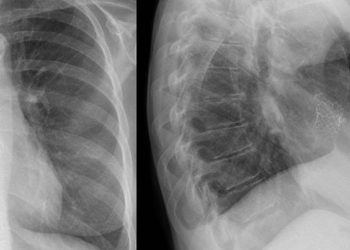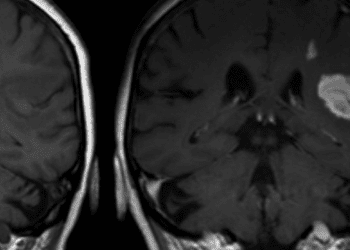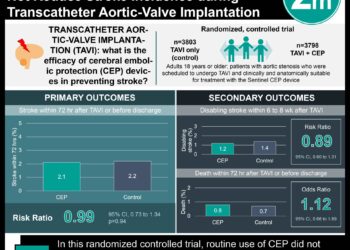Endovascular therapy associated with slightly improved outcomes in acute stroke patients with distal medium vessel occlusion compared with medical management
1. In this retrospective cohort study, among 286 patients with acute stroke with distal medium vessel occlusion treated with endovascular therapy (EVT) vs medical management alone, no significant difference in 90-day functional independence was found, however, EVT was associated with slightly improved 90-day excellent outcome.
2. The rate of symptomatic intracranial hemorrhage was similar in the EVT vs medical management groups.
Evidence Rating Level: 2 (Good)
Study Rundown: The efficacy of endovascular therapy (EVT) for cerebral reperfusion in acute large vessel occlusion stroke has been demonstrated in randomized clinical trials and established as a standard of care. The benefit of EVT in acute stroke with distal, medium vessel occlusion (DMVO), however remains unknown. The objective of this retrospective cohort study was to examine the efficacy and safety outcomes associated with EVT compared with medical management (MM) in patients with primary DMVO. Data was pooled from patients who had an acute stroke and a primary anterior circulation emergency DMVO between January 2015 and December 2019. The two cohorts consisted of patients receiving EVT and those receiving MM. The main outcomes to evaluate efficacy included 3-month functional independence (modified Rankin Scale [mRS] scores, 0-2) and 3-month excellent outcome (mRS scores, 0-1). To evaluate safety, outcomes included 3-month mortality and symptomatic intracranial hemorrhage. A total of 286 patients with DMVO were evaluated in this study, 156 of which were treated with EVT, and 130 were treated with MM. No difference was observed in the unadjusted rate of 3-month functional independence, excellent outcome, or mortality in the EVT vs MM groups. The rate of symptomatic intracranial hemorrhage was similar in the EVT vs MM groups. In the inverse probability of treatment weighting propensity analyses, the EVT group demonstrated slightly higher odds of an excellent outcome. A limitation of this study is that it is non-randomized. Patients treated with EVT presented with a higher baseline deficit, leading them to be at a higher risk for developing worse outcomes than those in the MM group. The strengths of this study included its sample size and its novel approach to assessing EVT in a patient population with primary DMVO.
Click to read the study in JAMA Network Open
Relevant Reading: Randomized assessment of rapid endovascular treatment for ischemic stroke
In-Depth [retrospective cohort]: This multicenter, retrospective cohort study examined the efficacy and safety outcomes associated with EVT vs MM in patients with a primary DMVO. Data was pooled from patients who had an acute stroke and primary anterior circulation emergency DMVO between January 1, 2015 and December 31, 2019. The cohorts consisted of patients receiving EVT and those receiving MM. A total of 286 patients with DMVO were evaluated, including 156 patients treated with EVT (mean [SD] age, 66.7 [13.7] years; 90 men [57.6%]), and 130 treated with MM (mean [SD] age, 69.8 [14.9] years; 62 men [47.7%]). No difference was found in the 3-month functional independence in the EVT vs MM groups (151 [51.7%] vs 124 [50.0%]; P= .78), excellent outcome (151 [38.4%] vs 123 [31.7%]; P = .25), or mortality (139 [18.7%] vs 106 [11.3%]; P = .15). The rate of symptomatic intracranial hemorrhage between both EVT and MM groups was similar (weighted: 4.0% vs 3.1%; P = .90). In inverse probability of treatment weighting propensity analysis, no significant difference between groups for functional independence (adjusted odds ratio [aOR], 1.36; 95% CI, 0.84-2.19; P = .20) or mortality was found (aOR, 1.24; 95% CI, 0.63-2.43; P =.53). The EVT group, however, demonstrated higher odds of an excellent outcome (mRS scores, 0-1) at 3 months (aOR, 1.71; 95% CI, 1.02-2.87; P = .04).
Image: PD
©2022 2 Minute Medicine, Inc. All rights reserved. No works may be reproduced without expressed written consent from 2 Minute Medicine, Inc. Inquire about licensing here. No article should be construed as medical advice and is not intended as such by the authors or by 2 Minute Medicine, Inc.







